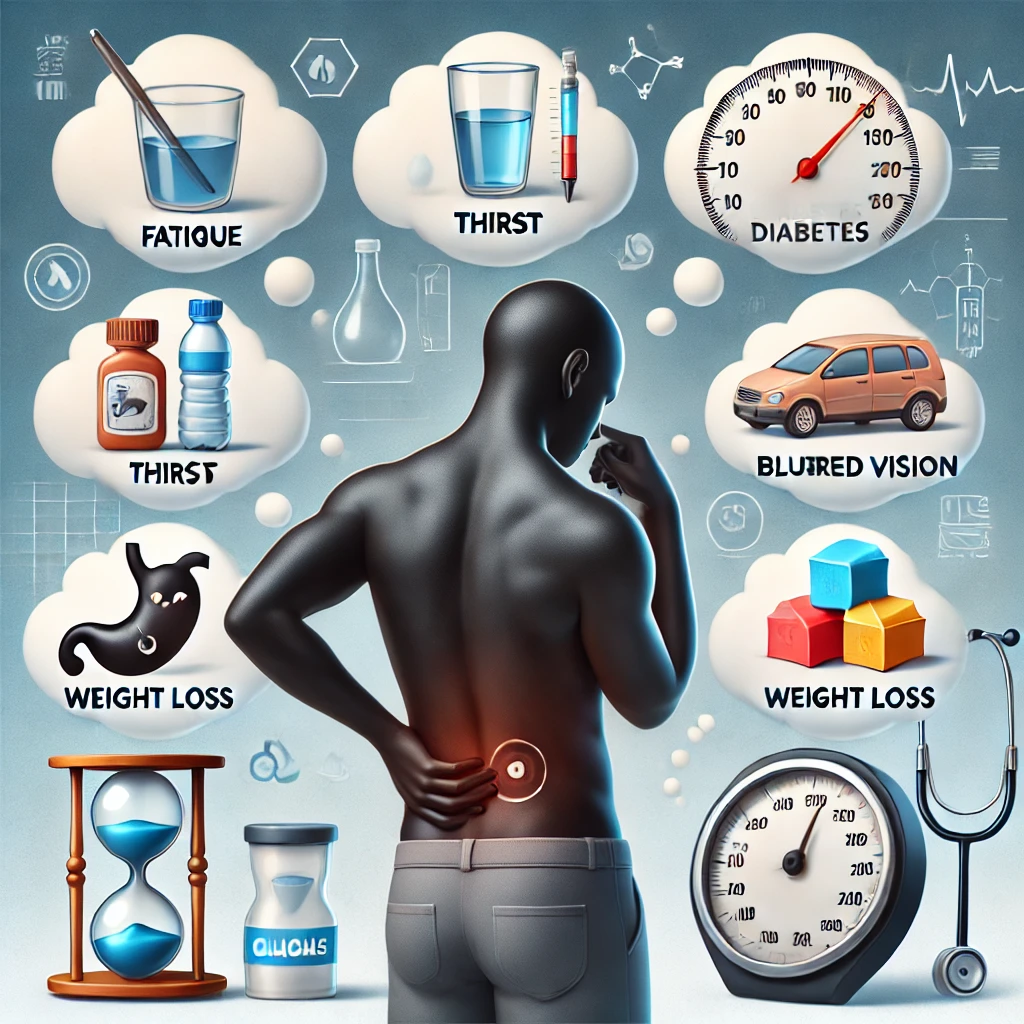What is Diabetes?
Diabetes is a medical condition marked by constantly high blood sugar. More than 11 million people are now living with diabetes in Nigeria.
Diabetes can have devastating complications if poorly managed. These include emergencies like the deadly diabetic ketoacidosis, and more gradual but no less serious conditions like blindness, heart disease, strokes, and kidney failure.
But often before these complications arise, more quiet symptoms would have already started. In this post we want to learn what these early symptoms of diabetes are. This will help us to quickly begin treatment and so prevent those complications from ever arising.
Types of Diabetes
- Type 1 diabetes: This occurs due to reduced production of insulin by the pancreas. So there is not enough insulin to drive in sugar from the blood into the body cells where the sugar is needed to burn energy. This leads to high blood sugar, fatigue and other symptoms which we will look at soon. It is commoner in younger people, like children.
- Type 2 diabetes: This occurs due to malfunction of insulin. Here insulin is adequate but does not function properly. So it cannot successfully drive sugar into the cells. This leads to high blood sugar. It is the commonest type of diabetes, especially in adults.
Early Symptoms of Diabetes
Frequent urination
Healthy people urinate between 4 and 7 times a day. But people with diabetes urinate more frequently, often getting up at night more often too. This is because the kidneys attempt to get rid of the extra sugar in the blood by dissolving it in very large volumes of water to be expelled as urine.
Excessive thirst
This is a result of the previous symptom. You may find yourself drinking much more often than usual.
Unintentional weight loss
If you lose more than 10% of your body weight in 3 months (without trying!), that could be a sinister sign of serious disease. In diabetes, sugar is the body’s usual energy source. But it is locked outside the cells because of low or malfunctioning insulin. So the body has to turn to other energy sources. These other energy sources are proteins in your muscle and fats everywhere in your body. That is the cause of the weight loss.
Fatigue
You may find yourself always feeling tired. That is because your cells don’t have enough sugar to burn fuel. It’s all locked out in the blood. That’s why diabetes is sometimes described as “suffering in the midst of plenty”.
Excessive eating
Your brain thinks the fatigue described earlier is due to the normal commonest cause- insufficient food. So the brain stimulates you to feel hungry and to eat. But the problem is not with food. It is with insulin. What you eat does not reach the cells. Therefore the hunger never goes. You keep eating and eating. And still you lose weight. And still, you are fatigued.
Poor wound healing
Diabetes weakens the immune system. This causes wounds to last for weeks or months before complete healing.
Blurry vision
High blood sugar sugars the lens in the eyes to swell with water. This can distort vision. Diabetes can also affect the blood vessels on the retina.
Frequent infections
Skin infections like boils may be more common. In women vaginal yeast infections and urinary tract infections may be more frequent.
Darkening of the skin
This occurs in the armpits, neck, under the breasts and in the groin. The skin becomes darker, thicker and velvety.

Differences in the Types of Diabetes
The symptoms almost always occur early and prominently in type 1 diabetes. They often last for a short time – days to weeks before the diabetes is diagnosed.
But in type 2 diabetes, the symptoms are not always present. In fact most cases have no symptoms till the complications appear or the condition is accidentally diagnosed during screening. Where symptoms are present, they last for a long time before the diagnosis is made – months to years sometimes.
Risk Factors
Because diabetes most commonly does not have symptoms, you should know the things that increase your chance of getting the disease
- Family history of diabetes
- Being overweight or obese
- Not being physically active
- Poor diet
- Black race
- Age greater than 45 years
- Hypertension
- History of gestational diabetes
- Polycystic ovarian disease
You can calculate your risk of getting diabetes using this online tool created by the American Diabetic Association.
Conclusion
You have learned the early symptoms of diabetes. If you notice any of these symptoms, please quickly go to the hospital and begin treatment. If you already have diabetes, please read how to properly manage this condition here.









